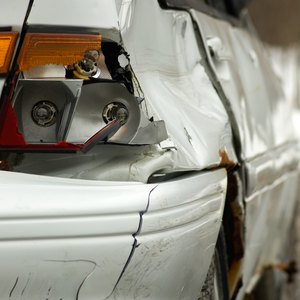
If you’re involved in a car accident and your car is severely damaged, your insurance company might declare it a total loss, in which case, they'll either pay you or replace your car. To determine whether or not your car is actually totaled, the insurance company calculates the cost it would take to repair the car. If the cost is more than the resale value of the car, or if it costs more to repair the car than the amount you can get from selling it, then the insurer declares your car a total loss. Insurance companies use various standards to determine the damages they’ll pay you when they declare your car a total loss.
Wholesale and Retail Values
The resale value of your car depends on how you’re selling it. The retail value of your car is the price you might ask for it or the estimated price of your car if a used car dealer sells it. This value depends on the condition of the car. While a low retail value indicates that the car shows signs of being well-used, a high retail value indicates that the vehicle is in better condition. Dealers can make up for the differences in values because they deal with a high volume of cars regularly. Insurance companies typically take into consideration the wholesale value of a car. That’s because a wholesaler selling used cars has a wider market, and car values can differ a lot more. Wholesalers don’t sell cars to the general public. They often get cars at wholesale car auctions that cater only to dealers. Just as in retail, the car values depend on factors such as condition and mileage.
Valuation Guides
To price the value of your car, insurance companies often use estimates prescribed in valuation guides such as the Kelley Blue Book and the National Automobile Dealers Association, or they might have their own formulas. They might also check with dealers in your geographical area to gauge the price of a car equivalent to the one you lost. If a similar car is not available in your area, the company might look further, but remember, areas also dictate the value of cars. For example, cars in the suburbs might be priced a little lower than cars in the city. Adjusters also might take into account recent repairs -- before the accident -- and optional equipment such as custom rims or a fancy stereo system. Make sure you provide the adjuster with receipts for the repairs and the optional equipment.
Condition of Car
When assessing your car, the insurance agent inspects the vehicle and rates it depending on its condition before it was damaged by the accident. If you’ve maintained your car well, that contributes to its value. For example, if the tires and interior, including the seats and carpets, are in good condition, or if you’ve changed the engine oil regularly or if the transmission is excellent, your car is worth more. Maintain all mechanical records and present copies to the insurance appraiser. Also, added features to your car, such as a stereo system or specialized wheels, increases the value of your car, but you’ll need to provide the installer’s bill so the appraiser can verify the date of installation.
Handling Disagreements With the Adjuster
If after conducting your own research, you find that the value determined by the insurance company is less than your estimate, you can ask for an independent arbitrator to reassess the vehicle. It’s also prudent to check your state’s department of insurance regulations regarding settling claims and diminished values. The diminished value of your car is the amount that depreciates because your car was involved in an accident -- even if you repaired it to perfection. Some states allow you to claim this value from your insurance company. As a last resort, you also can sue the insurance company.

